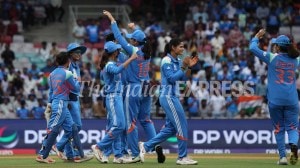Chief Ministers protest: SC order on police reforms violates Constitution
The Supreme Court’s controversial directions on police reforms that include fixing the tenure of Director-Generals of Police and setting up of a commission to insulate the police from the government, have come in for strident criticism from states.

The Supreme Court’s controversial directions on police reforms that include fixing the tenure of Director-Generals of Police and setting up of a commission to insulate the police from the government, have come in for strident criticism from states. As many as a dozen Chief Ministers, cutting across party lines, have alleged that the SC’s directions infringe on the powers of a state as per the Constitution, undermine the federal structure and erode the authority of the legislature.
The CMs, which include those of West Bengal, Madhya Pradesh and the six North-East states, have written to the Prime Minister expressing their objections and have asked him to get the Centre to either file a review petition or call a meeting of all CMs to discuss the next steps.
According to the SC’s order on September 22, 2006 — by a three-judge bench headed by outgoing Chief Justice Y K Sabharwal — on a writ petition filed by former BSF Director General Prakash Singh in 1996, the Centre and the states are scheduled to file individual “compliance affidavits” tomorrow.
But on December 30, besides the eight CMs, Bihar CM Nitish Kumar, UP’s Mulayam Singh Yadav, Tamil Nadu CM M. Karunanidhi and Kerala Home Minister questioned the Centre’s role in the wake of the SC order during a meeting chaired by Home Minister Shivraj Patil in the capital.
Sources said the most vocal was Nitish Kumar who accused the Centre of trying to destroy the federal structure enshrined in the Constitution. When Patil accused him of playing politics with police reforms, Nitish said that it was, indeed, a political issue as the SC’s directions “infringed on the powers of the states.” He was supported by Mulayam Singh Yadav. Both urged the Centre to file a review petition in the Supreme Court.
Even Karunanidhi, in his speech at the meeting, argued that the SC’s directive of giving a minimum tenure of two years to DGPs raised certain “practical difficulties” and the involvement of UPSC in the empanelment process “will neither be practical nor necessary as police is a state subject as per VII Schedule of the Constitution.”
In fact, much before this meeting, objections had come pouring in. After the Home Ministry circulated the SC’s directions on September 26 and drafted a model Police Act on October 30, Chief Ministers of Tripura, Nagaland, Mizoram, Manipur, Assam and Arunachal Pradesh wrote a letter to Manmohan Singh on November 16 stating the following:
• The Court’s directions are in direct contravention of constitutional scheme of allocation of powers as enshrined in the Constitution. The Constitution has specifically allocated “public order” and “police” to states.
• Any curtailment in the powers of a state will seriously undermine not only its ability to discharge its constitutional obligation in maintenance of public order, but would also be an encroachment on the state’s domain.
• The directions, therefore, impinge on the federal structure of the Constitution and undermine its basic nature.
The very next day, West Bengal Chief Minister Buddhadeb Bhattacharjee wrote to the PM that “maintenance of law and order, including state police, is a state subject and mandatory compliance of the court’s directions and acceptance of the model police Act appear to contravene this accepted position.”
Making out a case for states to formulate their own legislation keeping the SC guidelines in view, Bhattacharjee asked the PM to convene a meeting of CMs to discuss the issue.
He said the SC’s directions on setting up of a State Security Commission, state and district-level complaint authorities were unacceptable in their present form.
Echoing this was Madhya Pradesh CM Shivraj Singh Chouhan. On December 6, he wrote to the PM saying that the SC’s directions relate to issues/subjects lying in the domain of executive powers of the state.
Urging him to call a meeting of the CMs, he said: “The directions of the Court have to be implemented with due regard to prevailing conditions and exclusive responsibilities of the states towards law and order as it is bound to have far-reaching consequences..”
Even Kerala Home Minister adopted a similar tone in a letter to Shivraj Patil on November 18 and asked for a review petition.
Why these Chief Ministers are angry
The following SC directions, CMs say, infringe on the powers of a state since law and order is a state subject
• Set up a State Security Commission to ensure that state govt does not exercise unwarranted influence or pressure on the police.
• DGP to be selected by state from three seniormost officers empanelled for promotion by UPSC; DGP should have a minimum tenure of 2 years
• 2-yr minimum tenure for IGP, DIG, SP and SHO too
• Set up Police Establishment Board to decide on transfers, postings, promotions of officers of and below rank of DSP.
• Police Complaint Authority at district level to look into complaints against police officers up to the rank of DSP.
• Another such authority at the state Level to look into complaints against officers of the rank of SP and above. All recommendations binding on the authority.
• Centre should set up National Security Commission to prepare panel for selection and placement of Chiefs of Central Police Organisations with minimum tenure of 2 yrs.






- 01
- 02
- 03
- 04
- 05

























